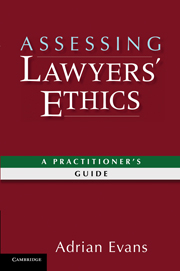Book contents
- Frontmatter
- Contents
- Preface
- List of figures
- Acknowledgements
- 1 An opportunity for law societies
- 2 Ethical failures, research and core qualities
- 3 Understanding ethical methods and types
- 4 Mechanisms to offset business pressure on legal ethics
- 5 Discovering practitioners' opinions about ethics assessment and psychological testing for integrity
- 6 Developing character
- 7 Measuring awareness of values and ethics
- 8 Entrenching ethics assessment
- Appendix A Research methods
- Appendix B Awareness of ethical type
- Appendix C Prototype scale of preference for legal ethical type
- Index
1 - An opportunity for law societies
Published online by Cambridge University Press: 10 January 2011
- Frontmatter
- Contents
- Preface
- List of figures
- Acknowledgements
- 1 An opportunity for law societies
- 2 Ethical failures, research and core qualities
- 3 Understanding ethical methods and types
- 4 Mechanisms to offset business pressure on legal ethics
- 5 Discovering practitioners' opinions about ethics assessment and psychological testing for integrity
- 6 Developing character
- 7 Measuring awareness of values and ethics
- 8 Entrenching ethics assessment
- Appendix A Research methods
- Appendix B Awareness of ethical type
- Appendix C Prototype scale of preference for legal ethical type
- Index
Summary
Professionalism versus commercialism: An opportunity for law societies
‘Professionalism versus commercialism’ (as famously identified by the International Bar Association) sums up a central struggle within legal practice. If lawyers are to serve justice consistently and with open eyes, it can be hard to say ‘no’ to some commercial opportunities and some clients. It is not a new struggle. Individual lawyers have always had to identify on a daily basis what is ethical and decline to meet some clients' demands. Many, probably most, succeed in this role, but in recent years major cases involving everything from document destruction to money laundering and deceit of the United Nations have occurred against a background of demanding corporate interests. In the process, negative public and especially judicial opinion about lawyers' ethics has been galvanised.
Response to the perceived decline in professional standards has been strongest in the United States, followed closely by the United Kingdom. Rhode for example, suggests US Bar leaders should just use the disciplinary process routinely, without bothering too much about constant ‘professionalism initiatives’. Reflecting frustration with unethical behaviour, Rhode has sounded almost at the point of discarding ethics as a bar association goal, for what she sees as the major public concern: access to justice.
Despite apparent good intentions and successive well-regarded reports over the last 20 years, there have been no really effective campaigns by the profession to pre-emptively develop and sustain members' ethics.
- Type
- Chapter
- Information
- Assessing Lawyers' EthicsA Practitioners' Guide, pp. 1 - 19Publisher: Cambridge University PressPrint publication year: 2010



